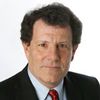Events such as those held by Remote Area Medical underscore glaring, heartbreaking gaps in American health coverage.
WISE, Va. — For a man who needed 18 teeth pulled, Daniel Smith was looking chipper.
Anxious, too, for he was facing a pair of forceps. But Smith, 30, a contractor with no health or dental insurance, who hadn’t seen a dentist in more than 20 years, was looking forward to an imminent end to the pain and rot in his mouth.
“I’ve always worked, since I was 14, but I’ve never had dental insurance,” Smith told me. After his teeth are out, he has a lead on low-cost dentures. “I’d like to have a straight smile,” he said. “I’ve never had one in my life.”
All around Smith were uninsured patients receiving free dental or medical care, including dozens in side-by-side dental chairs in the open air. Organizers mercifully arranged the long line of people waiting to have teeth pulled so that they were facing away from those currently enduring extractions.
Most Read Opinion Stories
The patients swamped the county fairground here for a three-day health extravaganza of free care organized by Remote Area Medical, an aid group that holds these events across the country. This one involved about 1,400 volunteers serving 2,300 men and women who needed care of every kind.
Some patients camped out for three days at the fairground gate before the clinic opened to make sure they would be treated.
The health fair reminded me of scenes I’ve witnessed in refugee camps in South Sudan. But here in America?
The sight is a wrenching reminder of how many Americans slip through the cracks. No other advanced country permits this level of suffering — and if the GOP health-care plan goes through, millions more will lose their health coverage.
“Walking around, listening to people, it breaks your heart,” said Gov. Terry McAuliffe, a Democrat, whom I encountered on the fairground. “We need a healthy workforce, and this is a disgrace.”
“Shame on us as a nation,” McAuliffe added. “This is an embarrassment to our country.”
That’s what I feel, too: humiliation that Americans need to be rescued by a group originally intended to help people in the world’s poorest countries (mixed with pride at the altruistic spirit that attracted so many volunteers, paying their own expenses to come here). To me, the fundamental lesson is that even under Obamacare, too many people don’t have coverage, and we urgently need a single-payer universal health care system along the lines of Medicare for all.
Remote Area Medical is the brainchild of Stan Brock, 81, a onetime British cowboy who in the 1950s managed one of the world’s biggest ranches, overseeing 50,000 cattle in Guyana in South America.
When he was badly injured by a wild horse, Brock was told it would be a 26-day hike to the nearest doctor. So he recovered on his own — but began to think about supplying health care to deprived areas.
Brock ended up founding Remote Area Medical to work in places like the Amazon, Haiti and Uganda. But then one day he had a call from Sneedville, Tennessee, where the hospital had just closed and the dentist moved out. “Can you come here?” the caller asked.
Brock loaded a dental chair on the back of a pickup truck and brought in a dentist as well — and 150 people lined up, desperate for oral care. The result is that while it continues some international work, Remote Area Medical also treats people in the world’s superpower.
Brock is a character: He discovered a species of bat that is named for him, and today he has no home but unrolls a pad each evening and sleeps on the floor of Remote Area Medical’s permanent offices in Tennessee. At 5 a.m. on the first day here, Brock opened the gate and began admitting people eager for care.
As they surged past, many stopped to thank him; one man had tears in his eyes as he did so.
“I wish Mr. Trump would come,” Brock told me. “The health of these people is appalling.”
Obamacare and the expansion of Medicaid have helped, but this health fair underscores glaring gaps in American coverage, especially for dental and vision care, in ways that affect us all.
In the vision tent, a patient couldn’t see even the biggest letter at the top of the eye chart. As he waited for glasses, a volunteer asked, “And how did you get here?”
“Oh, I drove.”
Jennifer Jolliffee, a volunteer, told of a 6-year-old boy who had behavioral problems, couldn’t read and struggled at school. Then he had his first vision screening, and his parents learned that he could barely see. Soon he was looking around in wonderment through glasses.
In another area of the fairground, doctors saw patients in private “rooms” created by sheets dangled from strings with clothespins. In one such room, Dr. Ross Isaacs saw William Powers, a former bulldozer operator with severe kidney problems, and outlined how Powers could maximize his chances of a kidney transplant. “I’ve got hope again,” Powers told me as he left.
As for Isaacs, he put it this way: “The success of this event is an indictment of our health care system.”
